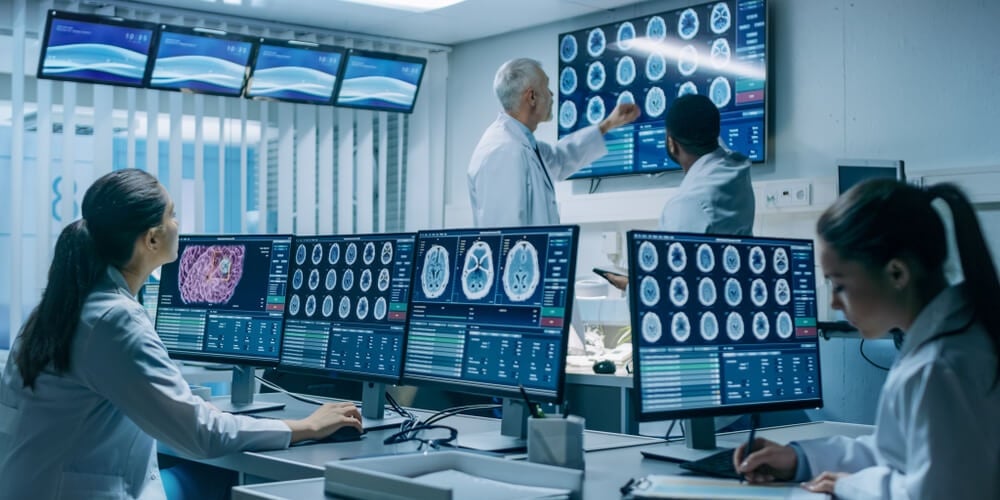New Secure Image Sharing Technology: Save Time and Reduce Costs

Healthcare organizations are always looking for ways to save time and money while providing quality patient care. As innovative technology emerges, new secure image-sharing technology that maximizes time and reduces costs has taken the forefront of data mobility.
The Pitfalls of Traditional Information-Sharing Technology in Radiology
Burning CDs and printing physical film had their fifteen minutes in the spotlight. Providing information utilizing traditional methods is beneficial but time consuming and adds extra cost to imaging centers, lacks efficiency and security, and decreases revenue. However, these conventional data-sharing methods helped pave the way for more sophisticated and secure imaging-sharing approaches.
The customary methods of image sharing by CDs or physical film have unique issues. For one, they are prone to loss, theft, or damage, putting patient data at risk, compromising confidentiality, and delaying diagnosis. Additionally, these methods are costly and do not offer the level of encryption required to protect sensitive information from unauthorized access. Other critical issues of the long-established image-sharing practices lack the speed of transfer at which images can be available for viewing elsewhere.
Furthermore, traditional methods lack mobile-friendly options and are not easily accessible. Healthcare professionals often need quick access to patient images while away from the office or during emergencies. Without a secure and mobile-friendly solution, accessing images becomes a time-consuming and arduous process.
With traditional image information-sharing methods, patients often have to call ahead or drop by an imaging center and request their reports and images. They may have to return hours or days later to retrieve the data. Some imaging and healthcare centers only provide image retrieval services at certain times due to a lack of resources needed to get the job done. When patients wait for their images and reports, their diagnosis may be delayed, causing angst to the doctors and possibly leading to dire patient outcomes. In addition, this time lag causes dips in patient satisfaction scores and a loss of revenue through physician referrals.
Many imaging centers and radiology departments rely heavily on DICOM and PACS, which require specialized software to view and analyze their data. Although these systems are fast and accurate, mobility and the speed at which dense data gets transmitted have proven challenging to patients, staff, and physicians.
In summary, the traditional image-sharing methods used in healthcare pose many challenges. The slow sharing speed, lack of secure encryption, and limited mobile accessibility all contribute to inefficiencies and potential risks to the patient.
Faster, More Efficient Solutions
As always, brilliant minds rise to the challenge to continuously meet the changing software needs of healthcare in every facet. Secure image sharing got a facelift and was elevated to another level using QR codes. These specialized generated codes have revolutionized the mobility and sharing of sensitive medical information.
CryptoChart Revolutionizes Secure Image Sharing
In 2020, MedTech named Novarad's CryptoChart the best new radiology breakthrough solution due to the software's ability to safely and efficiently share medical images and records. CryptoChart's image-sharing technology has revolutionized healthcare by providing a secure and speedy way to share images. It can generate uniquely designed QR codes with advanced encryption capabilities to ensure speed, security, and easy user access. It also saves time, reduces costs for imaging centers and radiology departments, and is compatible with most PACS and RIS.
The QR codes generated through CryptoChart provide secure access to electronic medical records through a trust chain guarantee. This technology provides high data security, mobile accessibility, and user friendliness, which makes it widely used by healthcare organizations.
Additionally, CryptoChart technology offers data-masking capabilities, ensuring the protection of sensitive information. Patient confidentiality is paramount in healthcare, and traditional image-sharing methods often put patient data at risk. However, CryptoChart encrypts sensitive information, making it inaccessible to unauthorized individuals and ensuring patient privacy.
Imaging providers, such as Ramapo Radiology Associates, saw a difference in time and efficiency for their staff, patients, and doctors when implementing CryptoChart. With the seven-day patient history storage ability, end users can access any medical records about a patient.
Access to a secure imaging sharing technology helps healthcare facilities provide their patients and clients with the fastest and safest viewing of sensitive data. With a set expiration of the QR-generated code, encrypted data is impossible to alter, ensuring the secure transfer of information.
The mobile-friendly QR code also provides secure image sharing through text and email—anywhere, anytime—thus enabling fast and convenient access to patient data, especially during emergencies or when a physician is away from the office.
As medical needs continue to rise and technology rapidly evolves, speed, efficiency, security, and cost savings of sharing vital information will remain a high healthcare priority.
CryptoChart is changing the way that medical images are securely shared, without the hassles, limitations, and expenses of burning and sending CDs. In just seconds, you can create a secure access link to share with physicians and patients without logins or passwords to manage, while being in full HIPAA compliance. Get started for free with CryptoChart.
%20(3).png?width=1555&height=462&name=Novarad%20EHS%20Logo%20Full%20Color%20(1)%20(3).png)
